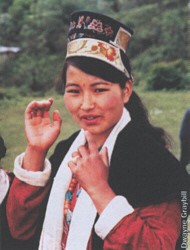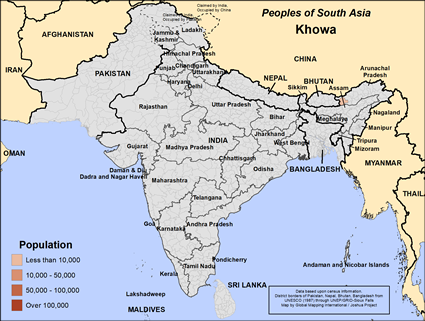Khowa in India

Photo Source:
Copyrighted © 2026
Peoples of the Buddhist World, Asia Harvest All rights reserved. Used with permission |

Map Source:
People Group data: Omid. Map geography: UNESCO / GMI. Map Design: Joshua Project
|
| People Name: | Khowa |
| Country: | India |
| 10/40 Window: | Yes |
| Population: | 1,400 |
| World Population: | 1,400 |
| Primary Language: | Bugun |
| Primary Religion: | Buddhism |
| Christian Adherents: | 21.20 % |
| Evangelicals: | 0.00 % |
| Scripture: | New Testament |
| Ministry Resources: | Yes |
| Jesus Film: | No |
| Audio Recordings: | Yes |
| People Cluster: | South Asia Tribal - other |
| Affinity Bloc: | South Asian Peoples |
| Progress Level: |
|
Identity
Approximately 800 people speak the Khowa language, which is commonly called Bugun, in north-east India. About half of all Khowa people 'reside in the two villages of Wanghoo and Singchung near the district headquarters at Bomdila in West Kameng District '. These communities are on the hillsides along both sides of the Rupa River (also known as Enga). 'The upper reaches of their land are lined by oak forests. The climate of the area is cold. In the upper reaches of the area, snowfall occurs in the months of January and February. The area experiences heavy rainfall in the months of May to August. '
The 1981 Indian census listed 625 Khowa people, down from a figure of 703 Khowa returned in the 1971 census. The Khowa 'are surrounded by the Sherdukpen on the west, with whom they share part of the Tanga valley, by the Monpas on the north, the Mijis or Dhamais on the east, and the Hrusos or Akas on the south '.
The Khowa language—which is an unclassified part of the Tibeto-Burman family—was first studied in the winter of 1913–14, when the British authorities compiled a 100-word list. Little research has been conducted since, except for brief reports by Ivan Simon (1976) and Rinchin Dondrup (1990). J N Chowdhury (1983) briefly mentions that the Khowa have 'a distinctive language which they zealously preserve '.
History
The Khowa say they originated in the north, in today's Tibet, before they moved southward in search of a new place to live. Locals believe that they arrived in the area before the Sherdukpen. For many years the Khowa were oppressed by the Aka tribe, who used to plunder them on the pretext of collecting taxes. The Khowa responded by relocating away from them. The Khowa are a colourful people. 'Their dresses during day-to-day occasions are very colourful which they also use during dances and festive occasions. That means they do not have any special dress for their dances and festivals, since they are colourful round the year. '
Religion
When the 1981 census was conducted, 606 of the 625 Khowa people stated that Buddhism was their religion. Two individuals said they were Hindus, eight were followers of 'other religions' (i.e., animists), and the remaining nine people did not state their religion. Other sources say that the Khowa believe in a mixture of traditional animism and Tibetan Buddhism. One researcher has found that the Khowa 'believe in one Supreme being who created the universe and life therein. They respect the Supreme God but do not worship [him].' Fear of demonic forces plays a major role in everyday Khowa life. For example, children are named immediately after birth, because 'the Khowas believe if there is a delay, some evil spirit will name the baby, and as a result the baby will suffer. When the child grows up to 16 to 17 years, the parents hold a worship called chhoacshao. This ritual is performed to please the spirit responsible for the welfare and betterment of the children. '
Christianity
There has never been a known Christian among this small tribe. Gospel audio recordings are available in the Khowa language, but are rarely utilized.